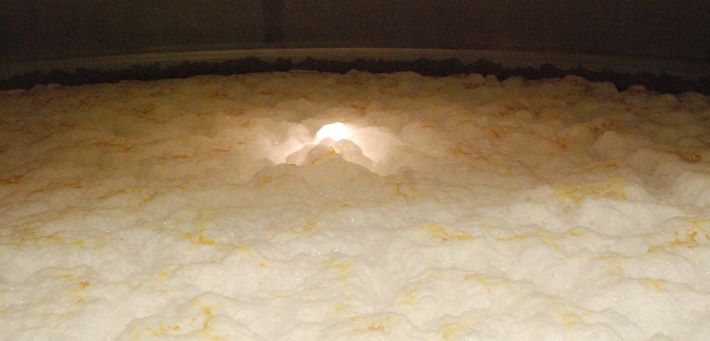
A Washington Post story yesterday discusses how “scientists in Chile harnessed the biodiversity of Patagonia to make novel yeast hybrids, potentially paving the way for new lager beer flavors.”
Early on, the principal investigator (that means he has skin in the game), says, “All the lager beers that we drink now come from a single event from a yeast generated 500 years ago. That makes most of the lager beers quite similar.”
Coincidentally, last week Good Beer Hunting posted almost 4,000 words about lager yeast.
My nit to pick in the first is that lagers don’t have to taste quite similar. In the second, this is not what I think the best brewers do: “When we think about the history of lager, we’re talking about the history of brewers and scientists trying to understand how to get yeast to do what they want.” My experience is that the real skill is figuring at what yeast want and giving it to them. That’s when the magic happens.
The strains coming out of Patogonia may well produce unique flavors, but that’s no excuse to diss what brewers are already using. In “Modern Lager Beer,” the authors point out that there are “notable difference even within lager strains bearing the same 34/70 moniker.”
Two brewers traveled around Bavaria sourcing yeast directly to assist Brewing Science Institute mapping out variations. The samples they selected displayed differences in maltotriose fermentation, attenuation, sulfur production, acetyaldehyde production, diacetyl removal, and ester production. The authors also cite research that confirms that lager strains adapt to their environment, finding that chromosomal variations can begin to occur within a dozen generations.
LEDE OF THE WEEK
DEI is so 2021. For many in the beer industry, as well as in the wider world, diversity, equity and inclusion has become old news, no longer worthy of column inches.
“I believe that the progress of social advocacy work in craft beer is in danger of stalling out completely or even rolling backward,” academic, activist and DEI professional Dr. J. Jackson-Beckham stated in a post on Crafted For All in September 2023. It echoed the feelings of many other DEI activists and advocates in the industry: One of powerlessness, frustration, and lack of support and progress has led to large-scale burnout.
— From Apathy Has Rained On Me — On DEI Burnout in the Beer Industry
KICKER OF THE WEEK (A tie)
Cascade was a brewery of a moment. We’ve had a few of these over the years. Old-timers still talk about Saxer’s lagers, and that brewery closed a quarter century ago. Cascade will leave a hole in Portland’s beer scene, one I suspect people will remember for another quarter century. This was a sad end, not least because it’s wrapped up in Art’s death. But few breweries leave a mark as indelible as Cascade.
RIP.
— From From Cascade Brewing, 2007-2024
KICKER OF THE WEEK (A tie)
I opted for a local porter, which arrived in a dirty pint glass, with no foam, on top of a Lord Hobo Brewing coaster.
The swagger, beer loving spirit, and opinionated passion that once propelled the place to the top echelons of American beer bars was gone. The Daniel Lanigan of that era would hate this place.
— From The Lord Hobo Bar is Dead
YOU MIGHT ALSO ENJOY
Beer has a sex problem. That’s not exactly breaking news, but thinking about how to separate sexiness from actual sexism—that’s an interesting approach.
The Circle of Brewery Life: Closures, Beer Medals, and More. Of the seven DC breweries that won medals at the Great American Beer Festival ten years ago, only three are making beer at their brewery today.
A trickle of news. As mentioned last week, I was surprised to see not much posted about Marcus Baskerville leaving Weathered Souls Brewing. There are a few more details in this story, including that in a social media post he wrote, he “left something that wasn’t with my spirit anymore. I left somewhere I didn’t have control.”
Cream Ale. I am going to leave it to Alan McLeod to comment on this post Thursday, but I appreciate the shout to “Brewing Local.”
Premiumization I. Boak & Bailey write about how beer brands have different meanings in different contexts—in this case Bass in Bristol. At the end they point to “the lingering sense that Bass is a premium product, which is what made it so popular in the West Country a century and more ago.”
Premiumization II. Ron Pattinson adds context to the chatter about cask ale. Including this: “Why is cask cheaper than keg? For purely historical reasons. When keg was introduced in the 1950s, it was marketed as a premium product. Which sold at a premium price. It was exactly the same with Lager. And is still true today. Keg Ale and Lager cost more than cask just because that’s what drinkers are used to. And what brewers/publicans can get away with.”
Hmm… do I understand that people prior to the 14th century apparently didn’t understand ice cellars… or storage of foods either, for that matter. Despite Central Europeans using and living in caves and around ice for many millennia.
There is probably some plugin I can add to this site that would a little heart to like a comment. Finding it is beyond my skill set. Instead, consider the comment “liked.””